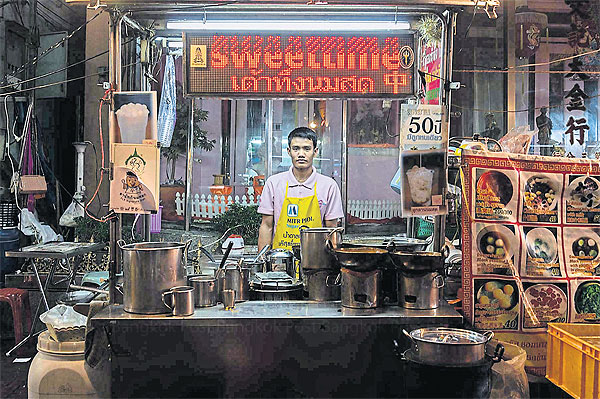As usual, the week of Chinese New Year will blanket Bangkok's Yaowarat district, aka Chinatown, in a festive atmosphere. Thais of Chinese descent will visit sacred temples and shrines, making merit and praying for good luck. Tourists will soak in the colourful pageants, watch lion dance shows and enjoy authentic Chinese cuisine.
But how Chinese is the Chinese New Year in Bangkok? Labour migration and demographic shifts have given rise to a Chinese New Year that reflects a complex cultural mix. Currently, those behind the impressive party in Yaowarat may no longer be only of Chinese descent.
Thai workers from the Northeast have plied their trade in Chinatown for years, but foreign labourers from Myanmar, Laos and Cambodia also arrive in waves. These are the men who stoke the engines of a prosperous Chinatown. You may notice that merchants and staff in Chinatown are not necessarily Chinese. Goldsmiths, waitresses in noodle and dim sum restaurants, vendors of colourful fruit juices — even those who sell decorative items for Chinese shrines — many are Thai or foreign workers.

AUNG MYO, FROM MANDALAY, MYANMAR
Called "Ao" by his Thai colleagues, Aung Myo wakes up in the afternoon to work the night shift, from 1am to 9am, as a merchant selling decorative items. He wears no shirt, only a comfortable sarong. His mouth is often filled with the red juice of betel nut, which he enjoys chewing. He is not very proficient in Thai, but he knows enough of the basics to get by, earning about 350 baht per day, an amount much higher than he would in Myanmar.
You can spot foreign workers everywhere in Yaowarat — you just might not notice. Their character, clothes and mannerisms mirror those of a Thai person's. The only thing that gives them away is their accents. Foreign labourers can fill the demand for low-cost labour, according to entrepreneurs in Chinatown. Moreover, Thai workers have become fussier, and don't want to work back-breaking jobs anymore.
"Thai labourers in Chinatown represent only 20% of the workforce. The rest comes from neighbouring countries, particularly Myanmar," said Chaikit Tantikarn, manager of Tang Toh Kang gold shop. "No matter where they are from, we recruit staff based on honesty and performance."
In the past, Tang Toh Kang employed both Thai and Chinese goldsmiths. The shop now buys its products directly from factories, which, of course, employ foreign labourers. Tang Toh Kang now has only two goldsmiths, who work on major orders.
Thai-Chinese people are known for their business acumen, and make up a large portion of the swelling middle class. Decades ago, when a young generation of Chinese upgraded themselves from labourers to entrepreneurs, empty labourer positions were filled by Northeastern people. Some workers from Isan can speak Chinese fluently, even better than the new generation of Thai-Chinese, who have the option of working in the white-collar market.
Jobs and duties such as cooking, performing in lion dances or conducting religious rites, however, remain for those of Chinese descent.
"I have more than 10 foreign labourers working in my shop, but I cook and season everything by myself. They are not very keen for such a job. Most labourers do the heavy jobs like cleaning or doing the dishes," Pannee Leelanukul, the owner of Jae Dang restaurant, said.
She insists the recipes for her food must be strictly followed, and said high expertise is required.
"Do not worry, most Chinese chefs in Yaowarat still cook by themselves."

NUNG MLO KO, FROM MAWLAMYINE, MYANMAR
Going by the Thai nickname "Fah", Nung Mlo Ko has worked in Bangkok for more than 10 years, selling crabs in the Old Market of Yaowarat. His Thai is perfect — the only thing that gives him away as a non-native is his pronunciation of several difficult words. He wakes up before 5am each day to start his duties, which include checking on deliveries from wholesalers and sorting crabs by size. After work, you can find him relaxing, chatting with friends or watching a movie on his iPhone in a quiet corner of the market. Fah regularly visits Myanmar, and hopes he can one day live in his home country.

BOONYAI DOKCHAN, FROM SURIN
Boonyai Dokchan came to Bangkok from Surin in 1977. He was 15 years old, and began working as an usher in a Chinese cinema, China Town Rama, in the heart of Yaowarat. Boonyai quit studying after receiving his primary education, and was invited to fill a job vacancy by an uncle who was working as a ticket salesman at the theatre. Boonyai loved watching movies, so he jumped at the chance. “The Chinese owner of the theatre liked industrious workers, and I did not fail at being one,” Boonyai said. “I never had a problem working with the Chinese boss.” The cinema screened films and Chinese operas. In the 70s, Boonyai said, the theatre was full of life and vibrancy, a place where Mandarin was loudly spoken and films were shown only in that language. New to the capital city and with a job that seemed like a dream, the young Boonyai had every reason to stay in Bangkok — and at China Town Rama. “I sleep here, shower here and live here,” Boonyai said. “I don’t have a house.”

